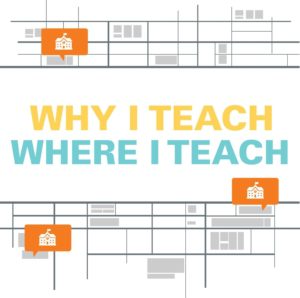Why I Teach Where I Teach: To Give Students Their Fair Shot
Kristin Re is a teacher at The Metropolitan Regional Career and Technical Center in Providence, Rhode Island, and she is a Teach Plus–Rhode Island Teaching Policy Fellow. About half of the student body at Met High School is Latino, and one-quarter is Black; two-thirds of students receive free or reduced-price lunch. Kristin, who is pursuing her Ed.D. from Northeastern University, has taught for seven years.
A few years ago, I had a ninth-grader tell me that she couldn’t do her work because she was “stupid.” It has remained one of the most heartbreaking moments I’ve experienced as an educator, and there have been many. This student was — and is — not stupid; somewhere along the way, she wasn’t given the time to master a skill before moving on to the next, and over time, this caused her to fall behind.
Working at the Met High School has given me the opportunity to help this student change her perception of herself. During the next few years, I worked with her, personalizing her education. We utilized her interests to make her work engaging, and we started where she was academically. We created assignments that targeted her areas of need, and we found ways of accessing content and skills that best complemented her learning style. She had manageable deadlines, but even when she struggled to meet them, she was not penalized punitively.
This is what I do with my students for the four years (grades 9-12) they are with me. In addition to personalizing each student’s education based on their needs, wants, and interests, I am able to get to know my students as humans; we have relationships. They can call or text me, and they do — at all hours. This type of educational setting is what attracted me to the Met.
That student who claimed to be stupid is about to graduate with a much more positive impression of herself. This is why I teach where I teach.
 This post is a part of an ongoing series, called “Why I Teach Where I Teach,” which asks educators in high-need schools to share what has attracted (and kept) them in the challenging environments they’re in. They share important stories and experiences that should remind us all of the power of strong school leadership, a network of supportive colleagues, and the genuine opportunity to have a say in schoolwide decisions. Listen up! They’re teaching us.
This post is a part of an ongoing series, called “Why I Teach Where I Teach,” which asks educators in high-need schools to share what has attracted (and kept) them in the challenging environments they’re in. They share important stories and experiences that should remind us all of the power of strong school leadership, a network of supportive colleagues, and the genuine opportunity to have a say in schoolwide decisions. Listen up! They’re teaching us.












